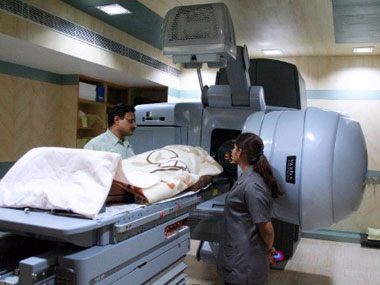Apollo Hospitals, one of India’s largest healthcare service providers, is looking to raise Rs 850 crore over the next six months to increase its bed-counts by 2,418 to 11,135 over the next three years, said AK Krishnan, CFO, Apollo Hospitals. The company could raise the money through a combination of debt/equity or a possible asset sale.
Founded by Dr Prathap Reddy in 1983, it set up its first 150 bed hospital in Chennai. Since then, the company has come a long way and can boast of having the largest number of hospital beds in India.
What’s interesting here is that the company is inclined towards raising a higher proportion of debt vis-a-vis equity.
[caption id=“attachment_36782” align=“alignleft” width=“380” caption=“What’s interesting here is that the company is inclined towards raising a higher proportion of debt vis-a-vis equity. AFP”]  [/caption]
However strange, as this may sound, it is true.
In Apollo’s case, almost 74 percent of the company’s shares are tied up between promoters and institutions, thereby leading to a low floating stock, which is a cause of concern as it dries up liquidity. A significant chunk of 41 percent of Apollo’s shares are held by institutions and private corporate bodies compared to its promoters holding of 33 percent.
Free float refers to shares held by investors who are willing to trade in the markets. It is a measure of how many shares are liquid and excludes those shares held by strategic shareholders (institutions, corporate bodies and promoters). Investors look at free float as an exit mechanism.
Impact Shorts
More ShortsAs per SEBI, listed companies are expected to have a minimum requirement of 25 percent public holding. If the same falls below this level, the company will have to bring the public shareholding back to that level within a year from the date of the fall.
Therefore, hiving off non-core assets augurs well for Apollo as compared to raising money through a mix of equity and debt.
The company could look at unlocking value from many of its non-core businesses like pharmacy, Health Street (BPO) and the insurance business.
A possible stake sale in Apollo Health Street, an associate company, that handles its BPO division, could help the company in generating the funds it requires for its expansion. It has a 39.38 percent stake in this company. It had filed a DRHP (2008) to offload 15 percent stake in Health Street to raise $70 million, valuing the entire business at $470 million. But abandoned the same due to poor market conditions. In 2010, revenues from this segment rose by 8 percent to Rs457 crore while net profit declined 44 percent to Rs 8.3 crore. The BPO business is a drag on the company’s overall profitability and does not add much value to the parent company. Therefore hiving off this division would benefit the overall profitability of the company.
Another potential fund raising idea could be a partial disinvestment of its pharmacy segment, which turned EBIT (earnings before interest and tax) positive during the March 2011 quarter. This is a positive sign compared to the losses it incurred previously. Entry of a strategic investor at this point of time could help ease Apollo of its financial burden as it plans to add 200 pharmacy stores every year.
The total cost of this expansion works out to Rs 1,290 crore, which is expected to be incurred over FY11-14. Of this, Rs 1,100 crore will be incurred by Apollo and the balance will be contributed by its joint-venture partner. Apollo has already invested Rs 277 crore till date.
SMC Equities expects Apollo’s revenues and profits to grow at a CAGR (compounded annual growth rate) of 27 percent and 14 percent, respectively during FY11-FY13, due to its expansion plans in Tier-II and III cities. (Refer to company’s presentation for the break-up of hospital beds).
If you are shareholders or retail investors looking to pick your stock look out for the following:
• Co derives revenues from Hospitals (70 percent) and Pharmacy (29 percent)
•Co to increase hospital beds by 28 percent to 11,135 by FY14
•Seven Hospitals have been awarded the JCI accreditions, highest in India so far
•Co well capitalised to benefit from medical tourism and derives 12-15 percent of revenues from this segment.
•It has the largest network of pharmacies in India (1,200 outlets) and plans to increase this by 200 stores every year.
•Earnings per share to increase to Rs 18.9 at the end of FY13 from Rs 14.57 earlier at the end of FY11
•It earns an average revenue of Rs 18,706 per occupied bed per day (ARPOB)
Private Equity players / bankers /Consultants watch out for:
•Co has still not appointed a banker for capital raise plan.
•FII stake rose to 29 percent at the end of March 2011 from 24 percent earlier
• Cash in hand is Rs 178 crore
•Total debt on balance sheet is Rs 958 crore
•Average cost of debt stands at 10.5 percent
You can view the company presentation here
Apollo Hospitals Investor Presentation June2011

)

)
)
)
)
)
)
)
)



